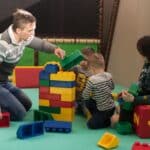What are some signs your autistic child will talk? Parenting is a journey filled with both challenges and joys. Each child is unique, and their development takes various paths. For parents of autistic children, understanding and supporting their communication skills can be particularly rewarding and demanding. The process of a child with autism learning to talk can be a pivotal moment in their development. In this article, we will explore the world of parenting an autistic child, focusing on the signs that indicate your child is progressing toward verbal communication.

Understanding Autism and Communication
Autism, or Autism Spectrum Disorder (ASD), is a complex neurodevelopmental condition that affects individuals’ social skills, communication abilities, and behavior. It’s essential to note that autism is a spectrum, meaning that its manifestations vary widely from person to person. Communication challenges are a common feature of autism, but the ways in which they manifest can differ significantly.
Communication difficulties in autistic children can include delayed speech development, limited vocabulary, difficulty understanding non-verbal cues, and challenges in maintaining conversations. Some autistic children may never develop spoken language, while others might exhibit remarkable growth in communication skills. The journey to verbal communication for an autistic child requires patience, understanding, and tailored strategies that cater to their unique needs.

Signs Your Autistic Child Will Talk
- Increased Imitation: One of the early signs your autistic child will talk might be on the path to talking is an increase in imitation. Children learn by observing and mimicking others. If you notice your child imitating sounds, facial expressions, or gestures, it could indicate their growing interest in communication.
- Engagement in Joint Attention: Joint attention is the ability to share attention with another person toward a common object or event. An autistic child’s willingness to engage in joint attention is a positive sign that they are progressing toward communication. This might involve them pointing at objects to share their interests or looking at you to show you something.
- Use of Gestures: Gestures are an essential bridge to verbal communication. Autistic children who begin using gestures like waving, pointing, or nodding are showing a desire to interact and communicate with others. These gestures pave the way for more complex forms of communication.
- Responsive to Speech: As an autistic child starts to develop communication skills, they might become more responsive to speech. They might turn their head towards sounds, react to their name being called, or display interest in listening to conversations.
- Expansion of Vocabulary: As an autistic child progresses, you might notice an expansion of their vocabulary. This could include learning and using new words, whether they are single words, short phrases, or even more complex sentences. Celebrate these small victories as they indicate your child’s growing ability to express themselves.
- Initiating Interaction: The shift from passive to active communication is significant. If your autistic child begins initiating interactions, such as requesting objects, asking questions, or seeking your attention, it’s a strong indicator that they are moving towards verbal communication.
- Improved Social Interaction: Communication is not just about words; it’s also about connecting with others. If your child demonstrates improvements in their ability to interact socially, such as sharing experiences, taking turns, and responding appropriately to social cues, it suggests progress in their communication skills.
- Echolalia Development: Echolalia refers to the repetition of words or phrases, often observed in autistic children. While it might seem like repetitive behavior, it can actually be a stepping stone to meaningful communication. As an autistic child with echolalia starts using these repeated phrases in context, it shows their growing understanding of language.
- Use of Visual Supports: Many autistic individuals find visual supports helpful in understanding and conveying information. If your child shows an inclination towards using picture cards, visual schedules, or other visual aids to communicate, it’s a positive sign of their willingness to communicate.
- Combining Words: As communication skills evolve, your autistic child might begin combining words to express more complex thoughts. This transition from using single words to forming phrases and sentences demonstrates their increasing ability to convey their thoughts and needs effectively.
Parenting an autistic child requires embracing their unique journey and celebrating every milestone along the way. While the road to verbal communication may be more challenging for some autistic children, it’s important to recognize that progress comes in various forms. The signs mentioned above provide valuable insights into an autistic child’s potential to develop spoken language skills. Every child is different, and the pace of progress varies, but with patience, understanding, and tailored support, many autistic children can overcome communication barriers and find their voice. As a parent, your unwavering dedication plays a crucial role in fostering an environment where your child’s communication skills can flourish.








Great content here. And yes, I can attest that when your kid is speech delayed, these signs will be there. I am a father of a 6 year old son and I thought that he would end up nonverbal. However when the SLP assessed him and saw these signs, they advised that he would speak. We just needed to get him out to be social as well as reduce his screentime.
I was worried about this with my son. He was 2 and barely saying a thing. Eventually the words came. You could tell he understood everything from a young age, he just didn’t want to talk.
My oldest son was not talking at age 3. Having this reassurance would have helped me back then.
Having friends and family members with kids on various points on the spectrum means i always am trying to find ways to help them when and where I can and posts like this give me the knowledge to do so..
This sounds like helpful advice for those that have children on the spectrum. It can be worrying when speech is delayed but good to know how to encourage communication.
I am not very familiar with autistic abilities, so this is very interesting to learn about. As a parent it is good to know what to expect when your child is on the spectrum.
This is a great informative post. As someone who has a nephew who is autistic, we have embraced many of these communication tips and they have been very helpful in his journey to learning how to communicate.
Gestures are really important. Some kids even learn to sign before talking, so it’s a great gateway.
Nurturing communication skills in autistic children is indeed a journey filled with challenges and joys, and having resources like this article makes navigating that journey a bit easier.
These look like good signs to keep an eye out for while waiting for your child to be ready to speak.
My niece is autistic and does a lot of the things on this list. Thanks so much for sharing it!!
I know somebody whose son still wasn’t talking at 2-years-old. They had to see a therapist. I don’t know if he is autistic, though.
This is such a wonderful and informative post for anyone that needs it. I know my niece had some issues when she was younger but she has done really well and talks and sings like crazy now!
I greatly appreciate the depth of information and empathy in this article. Learning about the different ways in which autistic children might progress towards speaking has been enlightening!
This post is amazing, it has a lot of good information on how you can support your child with is speaking delay. Thanks for sharing this with us.